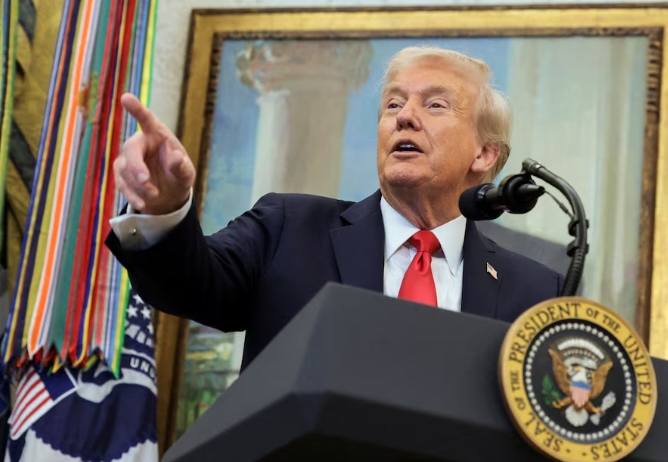The United States President Donald Trump said on Wednesday he would not seek a third term in office, a marked shift after months of teasing the idea despite constitutional limits, but it was unclear whether it was his final word on the matter.
Trump, who is known for changing his mind on major issues, was speaking to reporters on Air Force One during his Asia trip. His flirtation with the idea has alarmed opponents and constitutional experts, who say a third term would test the 22nd Amendment, which states no person shall be elected to the presidency more than twice.
“If you read it, it’s pretty clear — I’m not allowed to run. It’s too bad, but we have a lot of great people,” Trump said, a reference to other Republicans who could seek to succeed him after his current term ends in January 2029.
Trump, however, frequently takes what appear to be firm positions on issues, only to reverse course later. Trump, 79, has in the past repeatedly refused to rule out the possibility of seeking a third four-year term in 2028.
His comments came the day after a close political ally, U.S. Speaker of the House of Representatives Mike Johnson, said he had told Trump he did not see a path toward changing the Constitution to permit a third term.
The 22nd Amendment was adopted in 1951 after Franklin Roosevelt was elected president four times.
“It’s been a great run. But I think the president knows, and he and I have talked about, the constrictions of the Constitution,” Johnson told reporters on Capitol Hill.
“I don’t see a way to amend the Constitution because it takes about 10 years to do that, as you all know, to allow all the states to ratify … what two-thirds of the House and three-fourths of the states would approve,” Johnson said.
This week was not the first time Johnson has addressed the legal barrier to Trump serving a third term. A former constitutional lawyer who focused on religious rights and conservative social issues before being elected to Congress in 2016, the Louisiana Republican said earlier this year that Trump understood the constitutional limitations.
Johnson’s latest remarks drew a sharp contrast with some members of his House Republican majority, who have said publicly that they want Trump to seek a third term to prevent a Democrat from entering the White House.
Trump often teases a third term at his rallies and happily hands out “Trump 2028” hats to his friends at the White House.
Some political analysts see the third term references as a strategic way to remain relevant, antagonize his political opponents and avoid becoming a lame duck.
But some allies have taken his signals seriously, suggesting they are exploring legal or political pathways to make a third term a reality, even as most constitutional scholars dismiss the concept.
A far-right influencer and former Trump adviser, Steve Bannon, told The Economist last week that there are a variety of alternatives for Trump to stay in office. “At the appropriate time, we’ll lay out what the plan is,” Bannon said. “But there is a plan.”
Bannon did not immediately respond to a request for comment about Trump’s new comments.
One theory from his supporters has been for Trump to run as vice president, while another candidate stood for election as president then resigned, letting Trump again assume the presidency.
Trump said on Monday he would be allowed to do this but would not because “it’s too cute” and people would not like it. “It wouldn’t be right,” he said.
Trump’s acknowledgment about the limits of the Constitution could buoy any 2028 presidential aspirations held by Vice President JD Vance and Secretary of State Marco Rubio. Trump on Monday seemed to suggest Vance and Rubio could run together.
“I think if they ever formed a group, it’d be unstoppable,” he said. “I really do. I believe that.” Reuters


